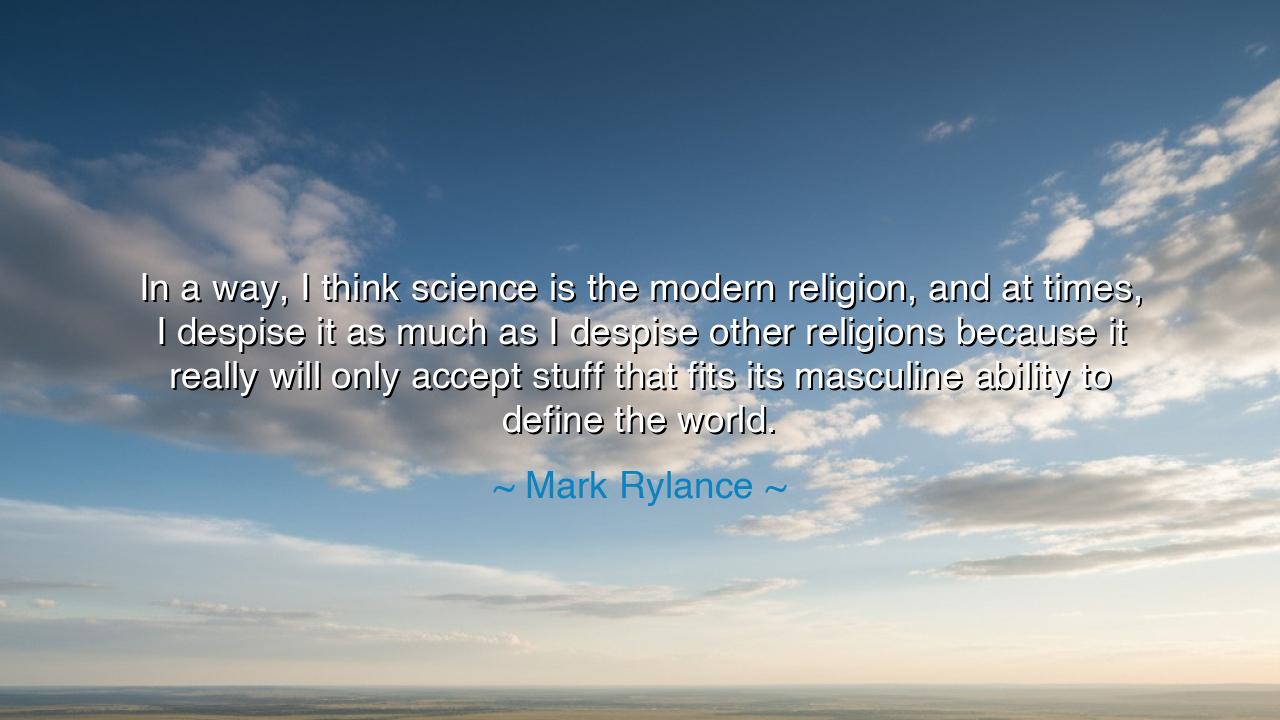
In a way, I think science is the modern religion, and at times, I
In a way, I think science is the modern religion, and at times, I despise it as much as I despise other religions because it really will only accept stuff that fits its masculine ability to define the world.






In the dim corridors of time, where wisdom lingers like incense smoke after prayer, the words of Mark Rylance echo with a strange, aching truth: “In a way, I think science is the modern religion, and at times, I despise it as much as I despise other religions because it really will only accept stuff that fits its masculine ability to define the world.” These words strike the heart like a bronze gong in a silent temple. They remind us that every age builds its own altar — once to gods of thunder and war, now to reason, logic, and the laws of science. Yet the nature of worship has not changed; only the idol has.
There was a time when humankind knelt before stone idols and asked for rain, harvest, or mercy. Today, we kneel before the gleaming screens of laboratories, seeking certainty and proof. Science, that proud child of curiosity, was born to free us from superstition. But as it grew in power, it too began to wear the robes of dogma. It proclaims what is real and dismisses what it cannot measure. Like the priests of old who condemned heresy, the modern scholar often scorns what cannot be tested, what cannot be weighed — the trembling soul, the intuition, the whisper of spirit that defies instruments.
Rylance’s words cut to this very wound. He calls out the masculine ability to define, not as a condemnation of gender, but as a warning against a way of seeing that seeks only control and order. To define is to conquer; to measure is to claim dominion. Yet the universe, in all its mystery, resists such capture. It is both mother and father, chaos and form, spirit and matter. To define it solely through masculine logic is to silence half its song — the half that speaks through dreams, poetry, and silence.
Consider the story of Galileo Galilei, the great herald of science. He gazed through his telescope and saw the moons of Jupiter dancing around their lord, a truth that shattered the dogma of his day. Yet, how bitterly ironic it is that the same spirit of discovery that freed him from religious tyranny has itself become a tyrant in another age. The Church once refused to look through his telescope because it threatened their order; now, the scientist refuses to look beyond the telescope, fearing what cannot be quantified. Thus, each generation builds its own prison of certainty, gilded with the pride of its age.
But not all knowledge dwells in laboratories or in the minds of scholars. The ancients knew that wisdom comes from listening — to the wind, to the rivers, to the human heart. When the warrior-priests of old consulted the stars, they did not seek proof; they sought relationship with the cosmos. Perhaps this is what Rylance longs for: a reunion between the masculine and the feminine in thought, where intellect and intuition dance together, where reason is tempered by reverence.
Let the story of Galileo remind us not of victory, but of humility. For every truth we discover, there lies a greater mystery still veiled. The wise do not scorn what they cannot explain; they bow to it. The arrogance of knowledge is the shadow of ignorance, and when we mistake science for faith, we lose both wonder and wisdom. The true seeker of truth walks not with the arrogance of certainty, but with the grace of curiosity.
So, what lesson may the children of the future draw from these words? Do not despise science — for it is a noble lamp that guides through darkness. But do not worship it either, for its light is narrow and fleeting. Balance its fire with the cool waters of mystery. Learn to say, “I do not know,” and let that unknowing open the gates of deeper understanding. The heart and the mind must labor together, each humbling the other.
And so, my children, when you gaze upon the stars or ponder the laws of nature, remember: the universe does not belong to you to define. You belong to it — to serve, to wonder, to listen. Let your knowledge be a form of love, not dominion. Let your science be touched with soul. Then, and only then, will the modern religion of science become what it was always meant to be — not a cage of facts, but a bridge to the infinite.






AAdministratorAdministrator
Welcome, honored guests. Please leave a comment, we will respond soon